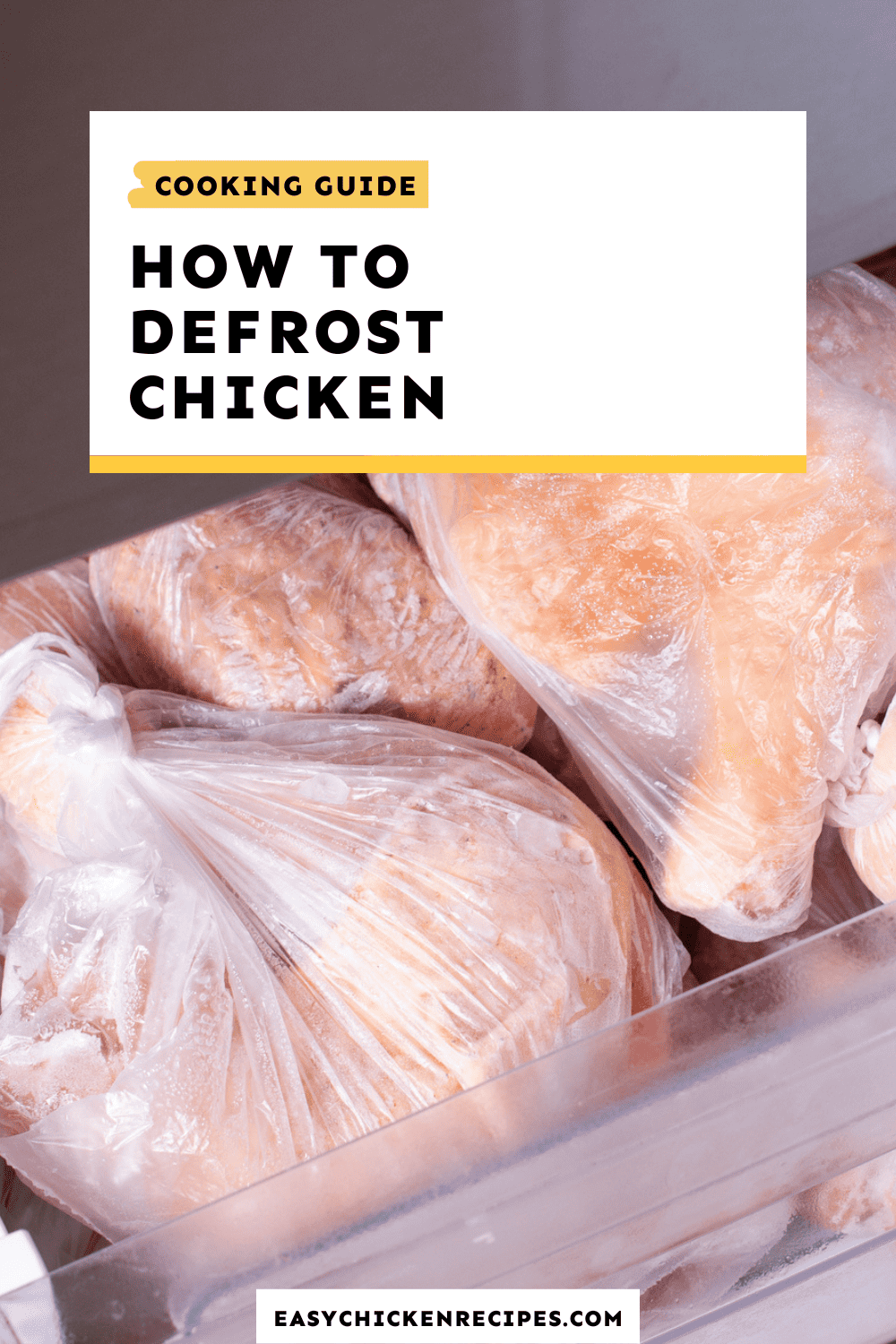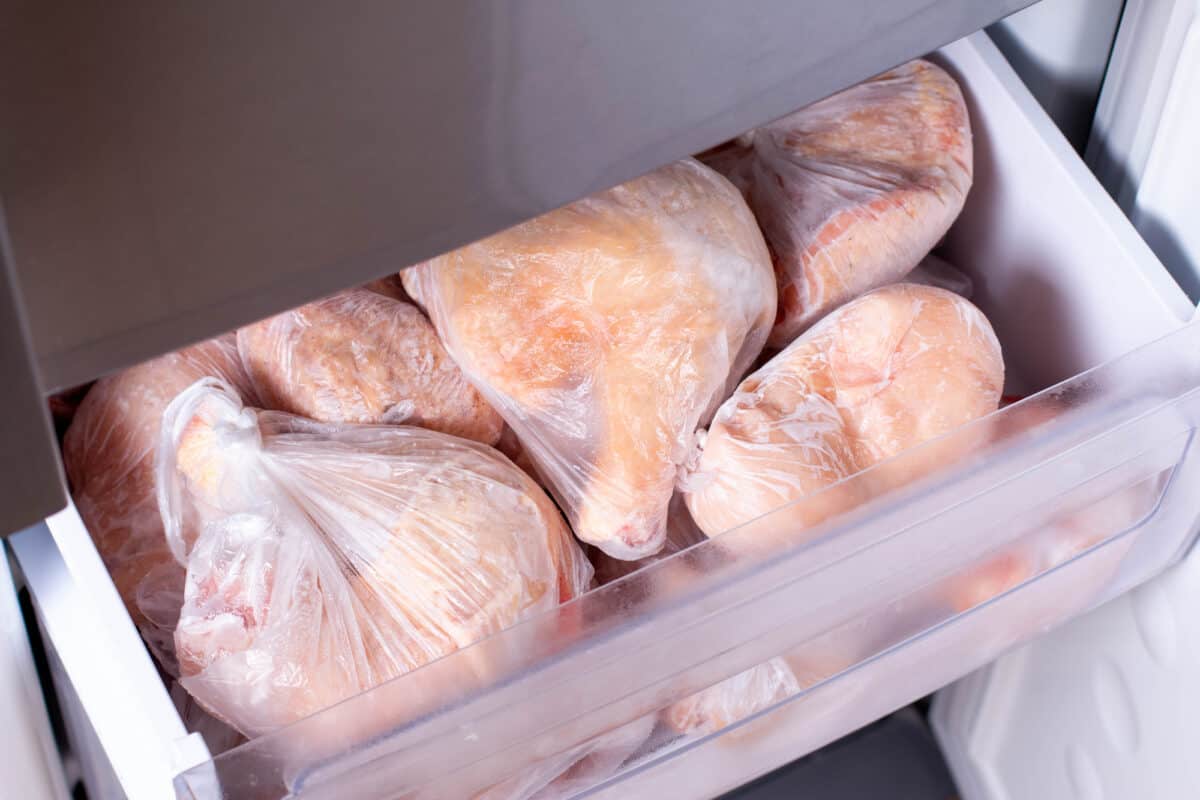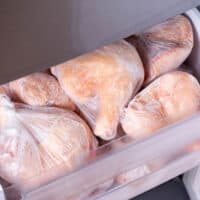[ad_1]
Find out how to defrost chicken safely with these 3 easy methods, and how long it takes. Use the microwave, thaw in the refrigerator, or defrost in water. Find the best and fastest way for thawing chicken depending on how much time you have!

How to Thaw Chicken
Keeping chicken in the freezer has been a lifesaver for me and my family. It’s great to have it on hand for easy dinners, and it keeps for such a long time when frozen. So when it comes time to cook it, I just have to remember to defrost the chicken before dinner.
Here are the 3 best ways to safely thaw chicken after it’s been frozen. Whether you have chicken breast, thighs, or even a whole chicken, follow these same rules for defrosting before cooking.
3 Ways to Defrost Frozen Chicken
According to the USDA, these 3 methods are the safest for defrosting chicken. But which option is best for you? Here are the pros and cons of each option. Choose your method, then check the step by step how-tos right below for the details.
- In the Microwave: This is the quickest way to defrost chicken. If you use this method, immediately cook the chicken after thawing. Why? The microwave will most likely start to cook parts of the chicken as it thaws. Chicken should never be partially-cooked and then saved for later. Either keep it uncooked, or cook it fully–there’s no in between here.
- In Cold Water: If you don’t have time to let chicken thaw in the fridge, submerging it in cold water is a safe way to slowly change the temperature. You will need to keep an eye on it, change the water regularly, and have the right type of bag. Chicken should be immediately cooked after thawing.
- In the Fridge: This is the easiest and safest way to do it, but it will take the longest amount of time. The defrosting will be gradual and kept at a safe temperature, and you won’t have to keep an eye on it or worry about it. If you’re not sure if you’ll end up cooking the chicken right away, this is the method you should use. You don’t need to cook right away and you can refreeze it if your plans change.

How to Thaw Chicken in the Refrigerator
This is by far the simplest way to defrost chicken, but it also requires the most planning and foresight.
- One or two days before you plan to cook the chicken, move it from the freezer to the refrigerator.
- Keep it in its packaging and let it sit. I recommend placing it on the bottom shelf of your fridge, apart from other meats or poultry, just in case there is any leakage as it thaws.
- 24 hours should be enough time for smaller amounts to fully thaw. If you have a whole chicken, give it up to 2 days to thaw.
It can sit in the fridge up to 2 days after it has been defrosted. You can safely return it to the freezer if you decide not to cook it.
How to Thaw Frozen Chicken in Cold Water
This method will usually take anywhere from 1-3 hours, depending on how much chicken you’re thawing. I recommend this for smaller amounts of chicken breast, ground chicken, or boneless chicken. I do not recommend this for defrosting a whole chicken, although you can.
- Place chicken in an airtight, leak-proof, resealable bag. It’s important that no water can get into the bag.
- Fill a large bowl with COLD water. Do not use hot or warm water, as that will start to cook the meat. You can fill your sink with cold water and use that instead of a bowl. Either way, make sure there is room to submerge the chicken.
- Place the chicken (in the bag) in the cold water and let it sit. Change the water at least every 25-30 minutes to make sure it stays COLD. The water will warm up as it sits so changing it is important.
- Keep changing the water until chicken has fully thawed, then cook immediately.
One pound or less of boneless chicken should only take about an hour. More than a pound, or bone-in pieces, will need 2-3 hours. Cook immediately after thawing.
How to Quickly Defrost Chicken in the Microwave
This method works best to thaw small amounts of chicken. It’s great for thawing chicken breast or small pieces. It’s the fastest method, so if you forgot to defrost the chicken for dinner, do this.
- Place chicken in a microwave-safe dish and set microwave to defrost.
- Cook 2-3 minutes at a time, then check it, and put it in for another 2-3 minutes, until it’s done.
- Once defrosted (middle is no longer frozen), finish cooking immediately.
It helps to reposition it or flip it each time you check it to make sure one part isn’t cooking more than other parts. However, this method will inevitably lead to some parts getting warmer than others.
How long does it take to thaw chicken?
Wondering how long it’s going to take to thaw or defrost that chicken?
- In the fridge: 1-2 days, depending on the amount of chicken. Less than a pound won’t need more than 24 hours. A whole chicken or larger amounts will need up to 48 hours.
- In cold water: 1-3 hours (or more for large amounts). Estimate 30 minutes per pound of chicken.
- In the microwave: For less than 5 pounds of chicken, it should take less than 15 minutes.
Food Safety Tips for Handling Chicken
- Chicken can be frozen indefinitely and still be safe to consume. I give it up to a full year in the freezer, although it’s considered safe even longer. So don’t be afraid to buy in bulk and store it in your freezer if you have the space.
- The “Danger Zone” for chicken is anywhere between 40°F and 140°F. When left at these temperatures for more than 2 hours, bacteria starts to grow on the surface, which makes it unsafe to eat, even after cooking.
- Thawing poultry or meat in hot water is NOT considered safe. The hot water starts to cook the surface while the rest is still frozen, plus it encourages bacteria growth.
- Never leave chicken out of the refrigerator for more than two hours. It should be put away as soon as you get back from the grocery store. Before or after cooking, it should be stored as soon as possible.
- Chicken should always be cooked to an internal temperature of 165°F before consuming. Whatever method you use to cook it, use a meat thermometer to check the temperature.
Yes, you can cook chicken straight from frozen, without the defrosting step, if you are cooking it in the oven or stovetop. Just increase cooking time by 50%. I still recommend thawing first for the best results, but in a pinch, cook longer than usual.
No. Thawing chicken at room temperature will leave it in the temperature “Danger Zone” for too long.
This depends on the thawing method you use and the size/amount of chicken. Check the timetable above.
After it’s been defrosted, it can sit in the refrigerator for 1-2 days before cooking. If you won’t be cooking it within that timeframe, put it back in the freezer.
No. Again, leaving poultry at room temperature for more than 2 hours is not safe. Never leave it out overnight, or for more than 2 hours.
This depends on how you thaw it. If plans change after thawing it in the fridge, it’s safe to refreeze the chicken (although there will be some loss in quality). However, if you’re using the microwave or cold water method, it should be cooked fully before freezing.

How to Defrost Chicken
3 ways to defrost frozen chicken: in the microwave, in the refrigerator, or in cold water.
Total Time : 15 minutes
Defrosting Time: 15 minutes
Servings: 4
Instructions
In the Microwave (Fastest)
-
Place chicken in a microwave-safe dish and set microwave to defrost.
1 chicken
-
Cook 2-3 minutes at a time, then check it, and put it in for another 2-3 minutes, until it’s done. Flip or reposition it each time you check to help it thaw more evenly.
-
Once defrosted (middle is no longer frozen), cook it immediately.
Thaw in Cold Water
-
Place chicken in an airtight, leak-proof, resealable bag. It’s important that no water can get into the bag.
1 chicken
-
Fill a large bowl with COLD water. Do not use hot or warm water, as that will start to cook the meat. You can fill your sink with cold water and use that instead of a bowl. Either way, make sure there is room to submerge the chicken.
water
-
Place the chicken (in the bag) in the cold water and let it sit. Change the water at least every 25-30 minutes to make sure it stays COLD. The water will warm up as it sits, so changing it is important.
-
Keep changing the water until chicken has fully thawed, then cook immediately.
-
One pound or less of boneless chicken should only take about an hour. More than a pound, or bone-in pieces, will need 2-3 hours. Cook immediately after thawing.
Thaw in the Refrigerator
-
Keep the chicken in its packaging, place it in the fridge, and simply let it sit. I recommend placing it on the bottom shelf of your fridge, apart from other meats or poultry, just in case there is any leakage as it thaws.
1 chicken
-
24 hours should be enough time for smaller amounts to fully thaw. If you have a whole chicken, give it up to 2 days to thaw.
-
It can sit in the fridge up to 2 days after it has been defrosted. You can safely return it to the freezer if you decide not to cook it.
Notes
- In the fridge: 1-2 days, depending on the amount of chicken. Less than a pound won’t need more than 24 hours. A whole chicken or larger amounts will need up to 48 hours.
- In cold water: 1-3 hours (or more for large amounts). Estimate 30 minutes per pound of chicken.
- In the microwave: For less than 5 pounds of chicken, it should take less than 15 minutes.
Nutrition Facts
How to Defrost Chicken
Amount Per Serving
Calories 409
Calories from Fat 261
% Daily Value*
Fat 29g45%
Saturated Fat 8g50%
Trans Fat 0.2g
Polyunsaturated Fat 6g
Monounsaturated Fat 12g
Cholesterol 143mg48%
Sodium 133mg6%
Potassium 360mg10%
Protein 35g70%
Vitamin A 267IU5%
Vitamin C 3mg4%
Calcium 21mg2%
Iron 2mg11%
* Percent Daily Values are based on a 2000 calorie diet.
[ad_2]
Source link
